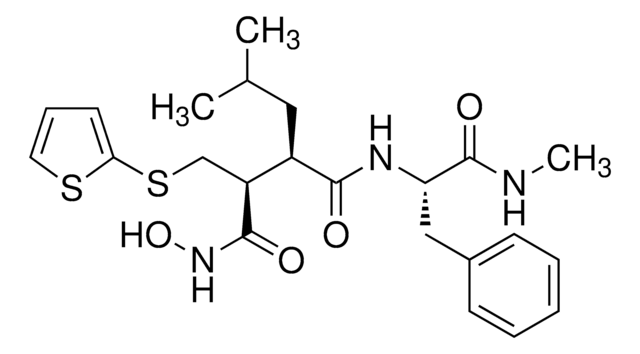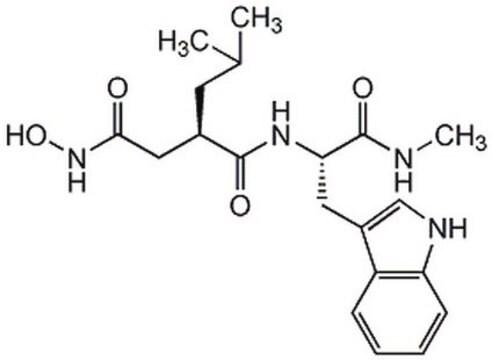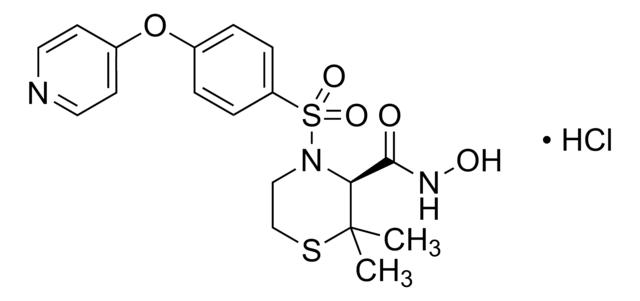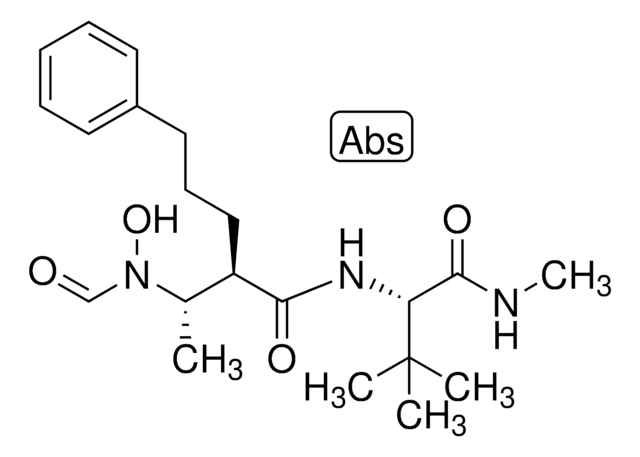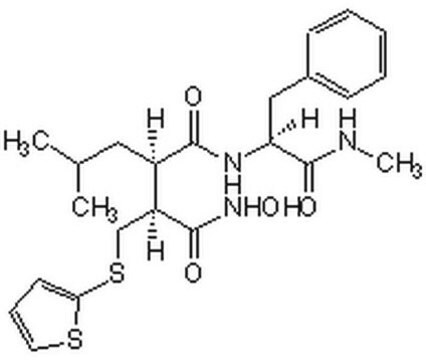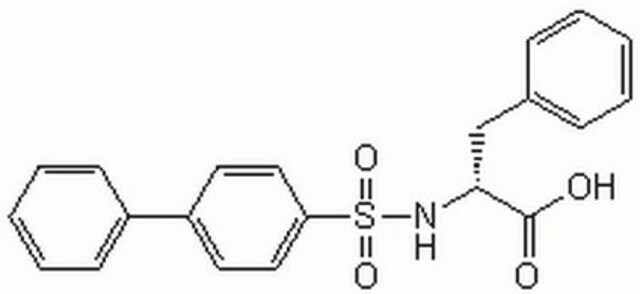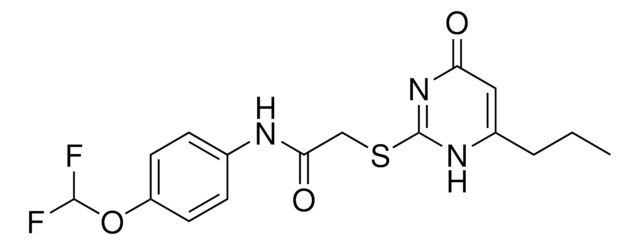CC10
GM6001 MMP Inhibitor
The GM6001 MMP Inhibitor controls the biological activity of MMP. This small molecule/inhibitor is primarily used for Biochemicals applications.
Synonyme(s) :
GM6001 Inhibitor
Se connecterpour consulter vos tarifs contractuels et ceux de votre entreprise/organisme
About This Item
Code UNSPSC :
12352200
eCl@ss :
32160405
Nomenclature NACRES :
NA.41
Produits recommandés
Niveau de qualité
100
300
Forme
liquid
Fabricant/nom de marque
Chemicon®
Concentration
1 mg/mL in DMSO
2.5 mM in DMSO
Numéro d'accès NCBI
Description générale
Specificity: GM6001 MMP inhibitor, also known as Ilomastat or N-[(2R)-2-(hydroxamidocarbonylmethyl)-4-methylpentanoyl]-L-tryptophan methylamide, is a potent inhibitor of collagenases. Molecular weight: 388.47
Reported Ki values are as follows (see Galardy Ref):·
Human MMP-1 (Fibroblast collagenase): 0.4 nM·
Human MMP-3 (Stromelysin): 27 nM·
Human MMP-2 (72 kDa gelatinase): 0.5 nM·
Human MMP-8 (Neutrophil collagenase): 0.1 nM·
Human MMP-9 (92 kDa gelatinase): 0.2 nM
Typical working dilution for use in cultured cells is 10-25 μM. GM6001 will precipitate from aqueous solutions exceeding 100μM. Aqueous dilutions should be performed using low salt buffers to prevent precipitation of GM6001 from solution (Recommended dilution buffer: 50 mM Tris pH7.5, 150 mM NaCl, and 20 mM CaCl2.2H20). It is recommended that the concentration of GM6001 in aqueous working solutions is determined upon dilution and confirmed prior to each use. Additional Application information:
Use in vivo
Typical dosage for GM6001 in animals is 50-100mg/kg body weight. It is generally administered IP every day or every other day. It is thought to cross the blood brain barrier since studies have shown it effectiveness in MS models.
If delivered by I.V. the half life in an animal is approximate an hour so it will have to be administered quite often. Thus the preferred way is to deliver the drug by I.P as a suspension in water or saline. The half life does not change but because it is dissolving in the animal′s system slowly, administration is not done as frequently. It has to be redelivered every other day or so. It can also be delivered subcutaneously in a saline suspension. The drug will precipitate as stay as a mass within the tissue, but surprisingly enough does get into the animal system to be effective.
Solubility
Soluble up to at least 400mg/ml in DMSO. It can then be diluted in water and must be mixed very quickly to avoid precipitation.
Stability
GM6001 in DMSO or Water at a concentration of 1mM (0.1mM is preferred) decomposes at the rate of 1% per month at 4%. At 37C this increases to 1% per day. At -20 it is quite stable and as a solid very highly stable
Low salt buffers are recommended as diluents to reduce precipitation. Diluted solutions should never be frozen.
Concentration of the stock solution should be periodically determined by absorbance at 280nm.
Reported Ki values are as follows (see Galardy Ref):·
Human MMP-1 (Fibroblast collagenase): 0.4 nM·
Human MMP-3 (Stromelysin): 27 nM·
Human MMP-2 (72 kDa gelatinase): 0.5 nM·
Human MMP-8 (Neutrophil collagenase): 0.1 nM·
Human MMP-9 (92 kDa gelatinase): 0.2 nM
Typical working dilution for use in cultured cells is 10-25 μM. GM6001 will precipitate from aqueous solutions exceeding 100μM. Aqueous dilutions should be performed using low salt buffers to prevent precipitation of GM6001 from solution (Recommended dilution buffer: 50 mM Tris pH7.5, 150 mM NaCl, and 20 mM CaCl2.2H20). It is recommended that the concentration of GM6001 in aqueous working solutions is determined upon dilution and confirmed prior to each use. Additional Application information:
Use in vivo
Typical dosage for GM6001 in animals is 50-100mg/kg body weight. It is generally administered IP every day or every other day. It is thought to cross the blood brain barrier since studies have shown it effectiveness in MS models.
If delivered by I.V. the half life in an animal is approximate an hour so it will have to be administered quite often. Thus the preferred way is to deliver the drug by I.P as a suspension in water or saline. The half life does not change but because it is dissolving in the animal′s system slowly, administration is not done as frequently. It has to be redelivered every other day or so. It can also be delivered subcutaneously in a saline suspension. The drug will precipitate as stay as a mass within the tissue, but surprisingly enough does get into the animal system to be effective.
Solubility
Soluble up to at least 400mg/ml in DMSO. It can then be diluted in water and must be mixed very quickly to avoid precipitation.
Stability
GM6001 in DMSO or Water at a concentration of 1mM (0.1mM is preferred) decomposes at the rate of 1% per month at 4%. At 37C this increases to 1% per day. At -20 it is quite stable and as a solid very highly stable
Low salt buffers are recommended as diluents to reduce precipitation. Diluted solutions should never be frozen.
Concentration of the stock solution should be periodically determined by absorbance at 280nm.
Actions biochimiques/physiologiques
Inhibitor Type: Protease Inhibitors
Protein Target: Interstitial collagenase
Forme physique
Provided at 1 mg/mL (2.5 mM) in DMSO.
Stockage et stabilité
Maintain frozen at -20°C in DMSO for up to 12 months. Avoid storage once diluted into aqueous solutions.
Informations légales
CHEMICON is a registered trademark of Merck KGaA, Darmstadt, Germany
Clause de non-responsabilité
Unless otherwise stated in our catalog or other company documentation accompanying the product(s), our products are intended for research use only and are not to be used for any other purpose, which includes but is not limited to, unauthorized commercial uses, in vitro diagnostic uses, ex vivo or in vivo therapeutic uses or any type of consumption or application to humans or animals.
Code de la classe de stockage
10 - Combustible liquids
Classe de danger pour l'eau (WGK)
WGK 1
Point d'éclair (°F)
188.6 °F - (refers to pure substance)
Point d'éclair (°C)
87 °C - (refers to pure substance)
Certificats d'analyse (COA)
Recherchez un Certificats d'analyse (COA) en saisissant le numéro de lot du produit. Les numéros de lot figurent sur l'étiquette du produit après les mots "Lot" ou "Batch".
Déjà en possession de ce produit ?
Retrouvez la documentation relative aux produits que vous avez récemment achetés dans la Bibliothèque de documents.
Ji Yoon Park et al.
Journal of biochemistry, 151(3), 291-298 (2011-12-16)
Screening of matrix metalloproteinase (MMP)-14 substrates in human plasma using a proteomics approach previously identified apolipoprotein A-IV (apoA-IV) as a novel substrate for MMP-14. Here, we show that among the tested MMPs, purified apoA-IV is most susceptible to cleavage by
Matthias P Lutolf et al.
Nature biotechnology, 21(5), 513-518 (2003-04-22)
We have engineered synthetic poly(ethylene glycol) (PEG)-based hydrogels as cell-ingrowth matrices for in situ bone regeneration. These networks contain a combination of pendant oligopeptide ligands for cell adhesion (RGDSP) and substrates for matrix metalloproteinase (MMP) as linkers between PEG chains.
Low molecular weight inhibitors in corneal ulceration.
R E Galardy et al.
Annals of the New York Academy of Sciences, 732, 315-323 (1994-09-06)
Notre équipe de scientifiques dispose d'une expérience dans tous les secteurs de la recherche, notamment en sciences de la vie, science des matériaux, synthèse chimique, chromatographie, analyse et dans de nombreux autres domaines..
Contacter notre Service technique
![(R)-N4-Hydroxy-N1-[(S)-2-(1H-indol-3-yl)-1-methylcarbamoyl-ethyl]-2-isobutyl-succinamide >95% (HPLC)](/deepweb/assets/sigmaaldrich/product/structures/381/824/43d65d68-be23-4584-80e5-31662c7f8f4a/640/43d65d68-be23-4584-80e5-31662c7f8f4a.png)
